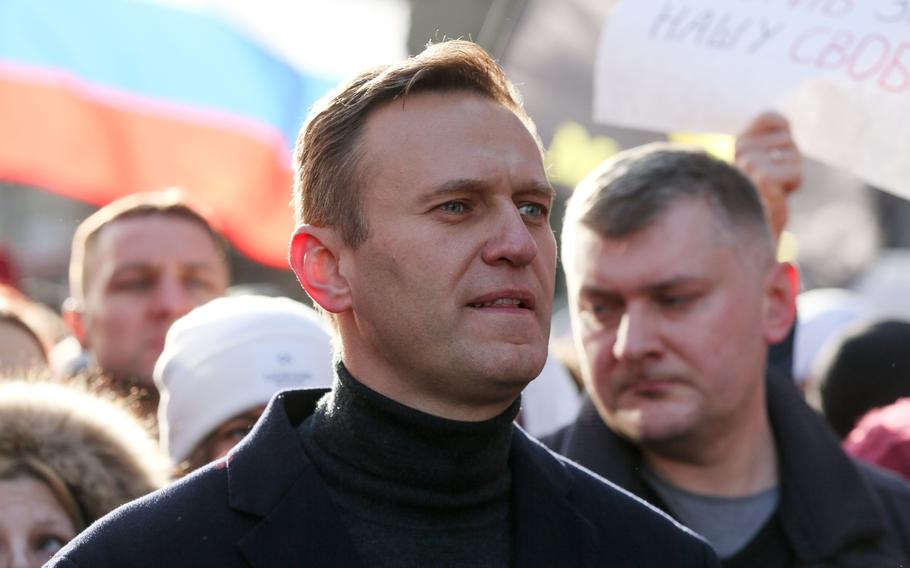
Alexey Navalny, Russian opposition leader, walks with demonstrators during a rally in Moscow on Feb. 29, 2019. (Andrey Rudakov/Bloomberg)
Jailed opposition leader Alexei Navalny, Russia’s most prominent critic of President Vladimir Putin and an outspoken opponent of his invasion of Ukraine, has been reportedly transferred out of his prison colony to a high-security facility known for the systematic abuse of inmates.
Oleg Yazhan, chairman of the Public Monitoring Commission of the Vladimir region, told state media that Navalny had arrived in “IK-6,” referring to a prison in Melekhovo, some 150 miles east of Moscow.
Navalny’s aides said they could not confirm that he had been transferred to Melekhovo and could not account for his whereabouts, though his legal team had been told he was being moved.
Earlier on Tuesday, Navalny’s allies had sounded an alarm, saying he was missing from the Pokrov penal colony, where he had spent months behind bars. The lawyer who went to see Navalny was told “there is no such convict there” and was turned away.
The reported transfer comes after a March court ruling that sentenced Navalny to an additional nine years in prison on charges of fraud and contempt of court. His legal team appealed, but the decision was upheld in May. Navalny has criticized all the cases against him as Kremlin attempts to thwart his political ambition.
“The problem with his transfer to another colony is not only that the high-security colony is much scarier,” Navalny spokeswoman Kira Yarmysh said in a tweet. “As long as we don’t know where Alexei is, he remains one-on-one with the system that has already tried to kill him.”
The Melekhovo facility has been the subject of multiple media investigations revealing brutality in the Russian penitentiary system and systematic abuse of prisoners by guards and other convicts.
“Abuse and torture are used against inmates in many Russian prisons, but IK-6 in Melekhovo is a monstrous place even by such insane standards,” Yarmysh said in a tweet in May, when it was first rumored that Navalny could end up there.
In videos from inside Melekhovo over the years, inmates have told stories of beatings, humiliation and rape.
“They pushed me into the office. There were six people in masks: Five were uniformed, the sixth was in a robe. They threw me on mattresses, tied my legs and arms, pulled off my pants and sat on my back,” said one prisoner, Artem Gribanov, describing how he was raped, in a clip recorded last year by his lawyer.
Jobir Zhuraev, another IK-6 inmate, said in a different recording that he was systematically drugged, beaten and humiliated. Zhuraev’s father told the Mediazona news outlet that his son slit his wrists in protest and tried to hang himself.
“There is no law there,” Yarmysh said. “And that’s where Putin wants to put Navalny for not being afraid of him and telling the truth.”
Navalny was immediately arrested upon returning in early 2021 from Germany, where he had been recovering from a severe nerve agent poisoning he blamed personally on Putin. The Kremlin denied any involvement.
A court then accused Navalny of violating the terms of his parole because he did not show up for checks with local authorities in Russia and sentenced him to two and a half years in jail. The opposition leader ridiculed the charge, saying he could not keep up with the visits since he was in a coma.
Even behind bars, Navalny has remained a vocal and determined critic of the Russian government. He used closing arguments in his multiple court appearances as a tribune for fiery political speeches and passed on written statements for his social media followers via lawyers.
In late May, he lambasted Putin as a “madman” for launching “the stupid war” in Ukraine and slammed the president’s allies as “enemies, traitors, and murderers of the Russian people.”
“Your time will pass. And when you all burn in hell, your grandfathers, who did not want you to start new wars in the 21st century, will throw in firewood,” Navalny said.
Just days after this speech, Navalny broke the news in an Instagram post that he had been charged in a new criminal case and could face an additional 15 years on top of his existing 11 1/2-year sentence.
“It turns out that I created an extremist group in order to incite hatred toward officials and oligarchs. And when they put me in jail, I dared to be mad about it and called for rallies,” he said facetiously.
Navalny’s political and anti-corruption networks, including the foundation that investigated Putin’s personal wealth, were declared “extremist” last summer and equated with the Islamic State and the Taliban in the eyes of Russian law. Many of Navalny’s allies have fled the country or faced persecution.